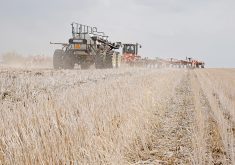In a previous article, we discussed the Agri-processing Investment Tax Credit as a new incentive that has been introduced by the Alberta government.
As promised, this article presents additional information on incentives that are offered in Saskatchewan and Manitoba.
The Saskatchewan government has issued the value-added Agricultural Incentive. This incentive is a non-refundable, non-transferable tax credit on capital expenditures of $10 million or more. The capital expenditures that are eligible are for new or expanded agricultural facilities that are adding value to the agricultural sector. Similar to the APITC, this credit will go against your taxable income.
Read Also

Canadian farmers need new tools to support on-farm innovation
Farmers need a risk management buffer that actually works and investment that drives advancements forward if Canada is to build resilience.
Upon the commissioning of a new or expanded facility, companies apply the tax credit against corporate income tax paid and can claim the credit over a three-to-10-year period.
In addition to reducing the tax paid, eligible applicants may claim any other eligible tax incentive or grant Saskatchewan may offer without affecting SVAI eligibility or impairing the ability to claim the SVAI tax credit.
Qualifying projects include new and existing value-added agricultural facilities. Projects of this nature must have $10 million in new capital expenditure, demonstrate the expenditures were made for the purposes of increasing productive capacity and meet the program’s definition of value-added agriculture activity. Finally, qualified third parties will be required to provide certification and confirm that the expenditures resulted in an increase in productive capacity.
In Manitoba, a comparable incentive is also in place. The Sustainable Canadian Agricultural Partnership allows a non-repayable, cost-shared funding incentive. This is available to value-added food processing businesses and applies to the purchase of processing equipment. This incentive ranges from $50,000 to $2.5 million, depending on the size of the project.
Four new funding streams have been added to help companies in Manitoba’s agri-processing sector. The focus is on increasing productivity, efficiency and profitability. Funding streams include growth and expansion of capital assets, specifically processing equipment. This stream of funding supports the expansion of Manitoba’s agri-processing sector through capital investment purchases for modernization activities that enhance efficiency, productivity and environmental sustainability.
A second stream of funding is in place for enterprise resource planning software. The focus of this stream is to support the continued growth of implementation of software that will help manage operations, increase efficiency and increase profitability by integrating company operations.
The third stream focuses on quality control capacity building and helps companies build capacity for quality assurance within their facility to monitor and manage potential issues caused by microbial growth or chemical or physical contamination.
The fourth stream supports entrepreneurs to scale up their food businesses by offering and increasing funding for co-packing services.
Under the Sustainable CAP, the Manitoba government will also offer a market development program. This program provides non-repayable, cost-shared funding for businesses engaged in Manitoba’s value-added food-processing sector for market development activities that enhance interprovincial trade and export capacity of individual businesses and improve overall domestic and international trade access for the sector.
The program will provide a 50 percent cost-share toward eligible expenses for a maximum grant per project of $30,000. The program provides funding to help support the launch of new products, increase market access by mitigating non-tariff barriers and expand domestic and international markets.
The western provinces are working hard to provide agri-business sectors with many opportunities to grow.
This concludes our articles focusing on agri-incentives offered across the prairie provinces. The incentives being offered create many opportunities to grow your business while reducing taxes payable. Consult your trusted adviser to see if you qualify for any of these programs.
Colin Miller is a chartered accountant and partner with KPMG’s tax practice in Lethbridge. Contact: colinmiller@kpmg.ca.















